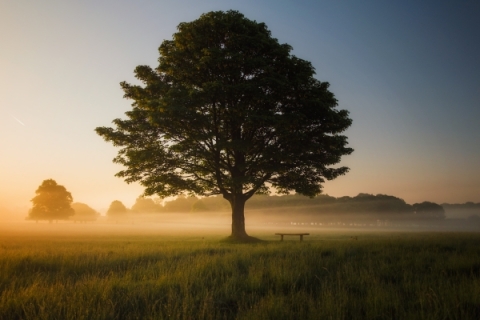It Sings
The air is like a butterfly
With frail blue wings
The happy earth looks at the sky
And sings.
Do you like this poem? I think it's quite beautiful. The words are simple, but the image is stunning. It engages our imagination and our emotions. It uplifts. There is rhyme and rhythm - it's a song, but without a melody. The poet called this poem "Easter" because he wanted to add another layer of depth to it; I think he could have called it "Spring," and the same purpose would have been accomplished.
The poet who wrote this poem wrote another poem which is far more famous; before we get to it, a few words about him.
Joyce Kilmer was born in 1886 in New Brunswick, New Jersey, USA. He came from a prosperous and erudite home - his father was a researcher and physician; his mother, a writer and composer. He himself was a gifted student, valedictorian of his graduating class, literary editor of his college journals both at Rutgers University and then at Columbia. He married his college sweetheart and they had five children, two of whom died in childhood. It was during one of his children's illnesses that Joyce turned to religion, more specifically to the Roman Catholic Church. He earned his living as a writer, an editor, and a very popular lecturer. In 1917, a few days after the United States entered World War I, he enlisted in the New York National Guard. His regiment was sent overseas and on July 30, 1918, at the age of 31, he was killed in battle. He is buried in the American Cemetery near Picardy, France.
In 1913, at the age of 27, Joyce Kilmer wrote "Trees."
I think that I shall never see
A poem lovely as a tree
A tree whose hungry mouth is prest
Against the earth's sweet flowing breast.
A tree that looks at God all day
And lifts her leafy arms to pray.
A tree that may in summer wear
A nest of robins in her hair.
Upon whose bosom snow has lain
Who intimately lives with rain.
Poems are made by fools like me
But only God can make a tree.
It is easy to find fault with the poem, and many have. But it continues to be one of the best loved American poems. It is, in many ways, astonishingly good. Although written a hundred years ago, the language still sounds fresh and clean. Of course, the rhyme and meter give it a musical quality. But it is in the exquisite imagery of the couplets that it attains poetic artistry. Look closely at the four middle couplets and you'll find a nursing infant, a soul at prayer, an adolescent girl, and a sensual woman, each of whom, by inference, is also a masterpiece of God's design.
Joyce Kilmer published about 40 poems during his lifetime. Critics like to describe him as sentimental, conservative, and old-fashioned. To see just how right they are, we can contrast his poem "Roofs" with Jack Kerouac's groundbreaking, seminal, modern novel On the Road.
The latter celebrates the freedom of the journey, the thrill of the unknown, experimentation and abandon. "Roofs" sounds a different note entirely.
...if you call a gypsy a vagabond
I think you do him wrong,
For he never goes a traveling
But he takes his home along.
And the only reason a road is good
As every wanderer knows,
Is just because of the homes, the homes,
The homes to which it goes...
There is something very comforting and reassuring in the poems of Joyce Kilmer. But at the same time there is something magical and elusive too. This combination makes his poetry appealing to so many.








Comments